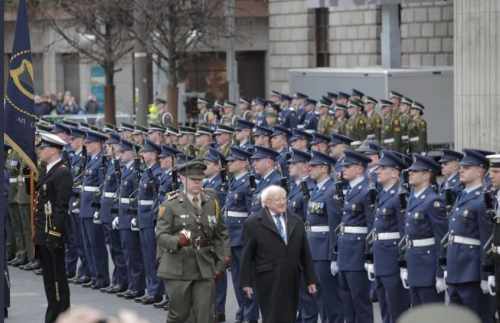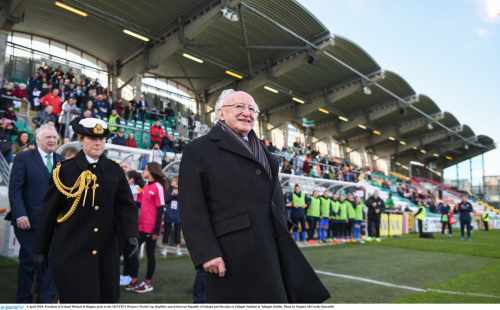Óraid an Uachtaráin ar ócáid do Phardún Mhaolra Seoighe
Áras an Uachtaráin, 4 Aibreán 2018
A chairde,
Fearaim fíorchaoin fáilte romhaibh go léir chuig Áras an Uachtaráin ar an ócáid fíorstairiúil seo. Inniu, tar éis moill céad tríocha sé bliain, tabharfaidh an Stát aghaidh, ar dheireadh, ar éagóir uafásach ar duine a bhí neamhchiontach i ndúnmharaithe déistineacha a déanadh sa bhliain 1882.
Is mian liom fáilte faoi leith a chur roimh chlann Sheoighe, atá gaolta leis an Uasal Maolra Seoighe, agus le theaghlach Seoighe a maraíodh. Cuirim fáilte roimh an Aire Flanagan, a chur spéis faoi leith sa chás agus a bhí lárnach sa phróiseas chun cinneadh Rialtais a sholáthar chun moladh go dtabharfaí Maithiúnas Uachtaránachta sa chás seo.
Cuirim fáilte chomh maith roimh siúd a ghlac páirt, in bhur slite dhifriúla, sa chás seo thar na blianta agus sa bhfeachtas chun aitheantas oifigiúil ón Stát a fháil gur éagóir a bhí i gceist i gcás Mhaolra Seoighe.
I will speak in both Irish and English this evening to ensure that everyone here is included in this historic event. I would like to welcome those of you here today who are related to Maolra Seoighe. As Maolra was a first cousin of Seán, you are also, of course, related to the members of the Seoighe family who were killed so brutally that August night one hundred and thirty six years ago. I would also like to welcome the relations of Pádraig Seoighe, who was hanged with Maolra and who, along with Pádraig Ó Cathasaigh, had admitted their part in the murders but who had testified that Maolra was innocent of any involvement.
I particularly welcome Minister Charles Flanagan who has been so central in securing a Government Decision to advise me, as President of Ireland, to grant a pardon in the case of Maolra Seoighe.
Tá buíochas ar leith tuilte ag Seán Ó Cuirreáin, ní hamháin toisc an leabhar suntasach sin “Éagóir” a scríobh, agus an bhaint a bhí aige le Ciarán Ó Cofaigh i gclár den scoth - Murdair Mhám Trasna – a chraolfar anocht, ach bhí sé an-chabhrach liom féin agus ócáid na hoíche anocht á eagrú. Mo bhuíochas duit a Sheáin.
I would also like to welcome all of you who have been involved in various ways in keeping the memory of this shameful episode in Ireland and Britain’s history to the fore.
Your determination to keep this issue alive has led to further research, which has manifested itself in books and documentaries, pod-casts and re-enactments, bringing this story to successive generations and now to a contemporary audience. This interest and, it must be said, simmering outrage and steely determination to revisit this case, has culminated in the Government inviting Dr Niamh Howlin of the School of Law in UCD to undertake a formal assessment of the case of Maolra Seoighe.
Her work has drawn on the evidence amassed by many of those present here and this has informed the government decision to advise me to proceed with a Pardon under Article 13.6 of Bunreacht na hÉireann.
Please forgive me for not mentioning each of you by name, but you have all played a part in us being here today to correct the historical record, and to declare that a man, Maolra Seoighe, was wrongly convicted of murder and was hanged for a crime that he did not commit.
Tá seanchleachtadh ag formhór mór agaibh ar an scéal truamhéalach seo. Dúnmharuithe uafásacha de chúigear clainne. Coir déistineach a chur uafás ar an tír uile.
Níl sé ródheacair orainn an mhór-thráma a bheadh ann d’aon phobal a tharlódh a leithead dóibh a shamhlú. Níos measa fós, b’fhéidir, do phobal tuaithe ar nós Mám Trasna, áit a bhfuil agus a raibh aithne ag gach éinne ar a chéile, agus an-chuid daoine gaolta lena chéile. Níl sé deacair orainn a shamhlú ach oiread, an scanradh anama a bhí ann sa phobal chéanna sna huaireanta, sna laethanta agus agus sna míonna i ndiaidh na dúnmharuithe, agus an cosúlacht a bhí ar an scéal gurb’ iad comharsa nó gaolta leo féin a bhí freagrach as an slad uafásach a déanadh ina measc.
Cuimhnímid inniu ar an gcúigear a maraíodh an oíche sin i mí Lúnasa, - Seán Seoighe, a bhean chéile Bríghid, a mháthair Mairéad a bhí ochtó bliain d’aois, a hiníon Peigí agus a mhac Mícheál, a fuair bás i rith an lae i ndiaidh na n-ionsaithe.
Bhí an méad a tharla i ndiaidh na dúnmharuithe chomh tubaisteach céanna. Léirigh cur chuige na póilíní, na cúirte agus polaiteoirí na linne sin nach raibh ach drochmheas ag na húdaráis ar chosmhuintir na hÉireann, ar phobal na Gaeltachta agus ar lucht labhartha na Gaeilge go háirithe.
We must recall that English was not the language of those at the centre of this case. Both the murder victims and the defendants lived their lives through Irish and few had any command of the English language, or certainty in its usage. When this heinous crime was committed - five members of a family butchered where they slept - the forces of an unsympathetic and arrogant colonial regime were unleashed on an already traumatised community.
A combination of a systemic contempt for the Irish-speaking accused and an extraordinary zeal to secure convictions regardless of testimony and evidence that should have raised serious misgivings, conspired to deliver what has been described as one of the clearest cases of miscarriage of justice in British legal history.
As President of Ireland I would like to acknowledge the efforts of British Parliamentarians who, over the years, have sought to have this miscarriage addressed by British Authorities, most recently Lord David Alton and of course the late Lord Avebury. While their efforts were ultimately unsuccessful their commitment to exposing flagrant breaches to the integrity of their legal system and its consequences for British-Irish relations was appreciated by many on this side of the Irish sea.
Táimid go mór faoi chomaoin ag an Dochtúir Niamh Howlin, nach féidir a bheith linn inniu, as ucht an taighde cuimsitheach a rinne sí ina hathbhreithniú ar an cás cúirte inar ciontaíodh Maolra Seoighe. Ar deireadh, chinn sí gur droch-chiontú a bhí i gceist. De thoradh na fianaise atá, agus a bhí ar fáil ag an am, is féidir a rá go cinnte nach raibh Maolra Seoighe ciontach sa dúnmharú inar cúisíodh é agus a crochadh é dá bharr. Toisc an easpa Gaeilge a bhí ag an breitheamh, na baill den giúiré agus a dhlíodóir féin fiú, agus toisc easpa aistritheora sa chúirt, ní raibh Maolra in ann imeachtaí sa chúirt a thuiscint nó páirt ceart a ghlacadh ina thriail.
Dr Howlin has concluded that Maolra Seoighe’s trial was unfair, not only by today’s standards, but by the standards of the time. Many aspects of witness testimony were inaccurate or falsified. The failure of the court to allow the surviving victim, Paitsí, to testify and provide crucial evidence which would have supported Maolra Seoighe also undermines the notion of a fair trial. Most obviously, conducting a trial where the jury, judge, prosecuting and defending lawyers do not share the same language as the accused, and where no meaningful translation is provided must surely remove any pretence of justice having been sought or delivered.
Dr Howlin also found it troubling that the response for a request for clemency from the former occupant of this House, Earl John Spencer, The Lord Lieutenant, was refused. That plea included statements that had been given to the Governor of Galway Prison from Maolra Seoighe’s co-accused, who were also to be hanged, that he had played no part in the murders.
While such testimony by those who had nothing to gain, might have been expected to secure a commutation of the sentence, the reply in this case, sent by telegram from this house, was “The law must take its course”. Earl Spencer had, after all, paid handsomely for perjured witness testimony to secure Maolra Seoighe’s conviction.
Cuireadh Maolra Seoighe chun báis ar an cúigiú lá dhéag de mhí na Nollag, 1882.
Disturbing parallels with later cases in this jurisdiction and in the British courts have seen the desire for convictions, fuelled by a pressurised political context or the baying of a less than thoughtful popular press, hold sway over the rights of individuals to a fair trial. Subsequently, as we have seen time and time again, there has been a steadfast refusal by the justice and political systems to acknowledge obvious miscarriages, and individuals pay an appalling price to prevent what the morally bankrupt might call an appalling vista.
Tá sé oiriúnach, b’fhéidir, go bhfuil muid bailithe le chéile inniu sa theach seo, Áras an Uachtaráin ó 1938, chun aitheantas, faoi dheireadh, a thabhairt don tragóid a tharla na blianta fada ó shin. Is sa theach seo a rinne an Iarla Spencer na cinntí éagsúla a bhain leis an gcás seo agus is ón teach seo a sheol sé an teileagram sin chuig Priosún na Gaillimhe.
Dá bharr sin, is pribhléid dúinne é go bhfuil an seans againn aitheantas a thabhairt don éagóir a déanadh, Pardún a fhógairt agus ainm Mhaolra Seoighe a ghlanadh.
Táimid ag admháil, tar éis 136 bliain, nach raibh Maolra Seoighe ciontach agus gur cuireadh chun báis é trí phróiseas lofa agus gur iomrall ceartais a bhí i gceist ina chás.
Ar dheis Dé go raibh a anam.
Go raibh maith agaibh.


